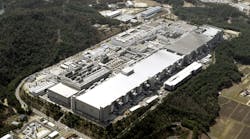Micron has been barred from selling certain memory chips in China after a preliminary ruling came down in patent infringement cases brought against it by United Microelectronics Corporation and Fujian Jinhua Integrated Circuit. The company called the order was unfair because the patents in question were not used in its products. But it also said that restrictions will only hurt its business slightly.
The order undercuts the sale of DRAM modules and solid-state drives sold under Micron's Crucial and Ballistix brands. The company said on Thursday that it expects to lose only one percent of its revenue because of the order, which was handed down by Fuzhou Intermediate People's Court in Fujian Province. Micron still estimates to generate between $8 and $8.4 billion of revenue in the fourth quarter ending in August.
In December, Micron introduced a lawsuit in United States District Court for the Northern District of California that accused UMC of stealing trade secrets and giving the technology to Jinhua. The Taiwanese chip manufacturer responded in January with a lawsuit alleging that Micron had infringed on its patent rights in China. Micron said that its claims “rely on distorted interpretations of the patents and improper evidence.”
“The central government of China has often stated that the rights of foreign companies are fairly and equally protected in China,” the company said, adding that it believed the ruling to be “inconsistent with this proclaimed policy.” Joel Poppen, Micron’s general counsel, added that it “will continue to aggressively defend against these unfounded patent infringement claims while continuing to work closely with its customers and partners.”
Boise, Idaho-based Micron has been hoovering up profit as demand for memory chips used in everything from smartphones and servers to thermostats and cars outstrips supply. That has raised prices for its products. The company – which only two years ago was losing money, eliminating jobs and weighing an acquisition offer from China’s Tsinghua Unigroup – nearly doubled its year-over-year profit last quarter, to $3.82 billion.
The ruling follows a recent raft of investigations by Chinese regulators into Micron and its South Korean rivals, SK Hynix and Samsung Electronics, on the grounds that the companies may be colluding to keep memory prices high. Micron, the largest American maker of memory chips, recently confirmed that it was under investigation, sparking fears that it would become entangled in the mushrooming trade conflict between China and U.S.
The trade dispute has intensified in recent months as President Trump accused Chinese companies of stealing American technology, particularly in chips. But the conflict boiled over on Friday when the administration enacted $34 billion of retaliatory tariffs on Chinese products, including electronic components like capacitors and diodes. Other tariffs under consideration would target processors and memory chips manufactured in the country.
Simultaneously, China is trying to reduce its dependence on imported chips. The country is the world’s largest market for chips but China's homegrown suppliers are dwarfed by American rivals. The Chinese government has poured billions of dollars into shifting the balance of power. And many American chip suppliers can only do business in the country by partnering with local companies, sharing their expertise and intellectual property.

